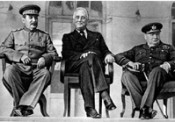
Government heads of the USSR, USA and Great Britain at the Tehran conference began
From November 28 to December 1, 1943 in Tehran (Iran) took place the conference of the three allied states heads: I.V. Stalin (USSR), F. Roosevelt (USA) and W. Churchill (Great Britain).
During the conference it was agreed that the allies would open the second front in Europe that despite their obligations they had not opened neither in 1942, nor in 1943.
Meeting the insistent requests of the USA and Great Britain governments and with a view to reduce the war duration at the Far East, the USSR declared that it was ready to join the war against Japan on finishing the military actions in Europe despite the existing neutrality agreement with this country. The consequence of this decision for the USSR (and later for Russia) was its complicated relationship with Japan.
During the Tehran conference there were also discussed the issues of the postwar cooperation and the peace security. The published declaration accentuated the necessity of the unity of activities. The heads of the three states also exchanged their opinions on the future structure of Germany. The USA raised the question of breaking down Germany into five autonomous states. The Soviet Union proposed to keep a single German state under the condition that its military power would be weakened and all the conquered territories would be seized from it.
In connection with the discussion regarding Germany’s future there was concluded a preliminary agreement on setting the borders of Poland along “Curzon Line” of 1920 at the east, and along Odra river at the west. Thus the territories of West Ukraine and West Belorussia went to Russia.
There was also approved “The declaration on Iran” where the participants declared “their desire to keep the absolute independence, sovereignty and territorial inviolability of Iran”.
Tehran conference was one of the most important diplomatic events in the course of the Second World War. It proved to be a significant stage in development of international and inter-allies relationship of the period and contributed to the end of the war approach.
Lit.: Бережков В. М. Страницы дипломатической истории. М., 1987; То же [Электронный ресурс]. URL: http://militera.lib.ru/memo/russian/berezhkov_vm2/index.html; История международных отношений и внешней политики СССР. Т. 1. М., 1986; Кузнец Ю. Л. Тегеран 43. М., 2006; Советский Союз на международных конференциях периода Великой Отечественной войны 1941-1945 гг. Т. 2. М., 1984.
Based on the Presidential Library’s materials:

